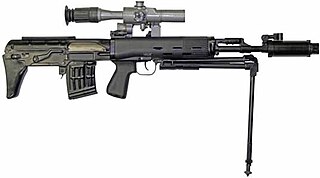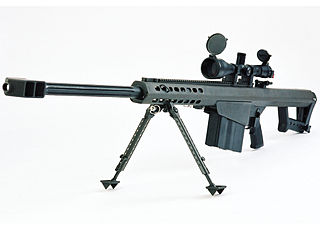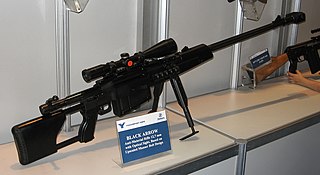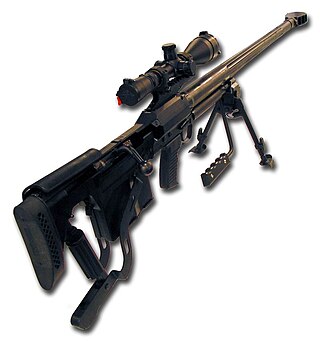
A bullpup firearm is one with its firing grip located in front of the breech of the weapon, instead of behind it. This creates a weapon with a shorter overall length for a given barrel length, and one that is often lighter, more compact, concealable, and more maneuverable than a conventionally configured firearm. Where it is desirable for troops to be issued a more compact weapon, the use of a bullpup configuration allows for barrel length to be retained, thus preserving muzzle velocity, range, and ballistic effectiveness.

An anti-materiel rifle (AMR) is a rifle designed for use against military equipment, structures, and other hardware (materiel) targets. Anti-materiel rifles are chambered in significantly larger calibers than conventional rifles and are employed to eliminate equipment such as engines and unarmored or lightly armored targets. Although not originally designed for use against human targets, the bullet weight and velocity of anti-materiel rifles gives them exceptional long-range capability even when compared with designated sniper rifles. Anti-materiel rifles are made in both bolt-action as well as semi-automatic designs.

The Barrett XM109, originally known as the Objective Sniper Weapon (OSW) and now called the Anti-Materiel Payload Rifle (AMPR), is a prototype anti-materiel sniper rifle. It is chambered for 25 × 59 mm grenade rounds and was developed by Barrett Firearms Manufacturing. It was designed in accordance with a requirement set out in 1994, and is capable of defeating light armor and equipment out to 2 km.

The Barrett M82 is a recoil-operated, semi-automatic anti-materiel rifle developed by Barrett Firearms Manufacturing and produced in the United States.
Steyr Arms is a firearms manufacturer based in Austria. Originally part of Steyr-Daimler-Puch, it became independent when the conglomerate was broken up in 1989. Prior to 1 January 2019, the company was named Steyr Mannlicher GmbH Co. KG. In April 2024, the company was acquired by Czech RSBC Holding a.s., which owns also Slovenian gun maker Arex Arms.

The RT-20 is a Croatian bullpup anti-materiel rifle developed by Metallic in Rijeka in the mid-1990s and marketed by RH-Alan. The name itself is an acronym of the Croatian word Ručni Top 20, or "Hand Cannon 20mm". Operating with a bolt action, it houses a single 20mm round and must be reloaded after each shot. Given its large caliber, it is one of the most powerful anti-materiel rifles currently in use by any country and is comparable to the South African Denel NTW-20 and the Indian Vidhwansak.
The Gepárd anti-materiel rifles are a family of Hungarian weapons manufactured by Sero International Kft. designed to destroy unarmored and lightly armored targets. These long-range large-caliber rifles have high accuracy and muzzle velocity. In 1987, the Hungarian People's Army sought to obtain a compact, mobile weapon that could damage lightly armored targets. The project, led by Ferenc Földi, culminated in the creation of the Gepárds.

The M93 Black Arrow is a Serbian bolt-action 12.7×108mm anti-materiel rifle, developed and manufactured by Zastava Arms.

The DSR-1 is a compact bolt-action sniper rifle designed, manufactured and marketed by the German company DSR-Precision GmbH and was also marketed by the German company AMP Technical Services as a specialized sniper rifle for police sharpshooters. It has been adopted by the German counter-terrorist unit GSG 9, as well as by other European special police units and agencies.
The Barrett XM500 is a gas-operated, semi-automatic, anti materiel/sniper rifle in development by the Barrett Firearms Company as of 2010. It is fed by a 10-round detachable box magazine situated behind the trigger in bullpup configuration.
The following is a list of infantry equipment of the People's Liberation Army of China.
The DSR-Precision DSR-50 is a bullpup bolt-action anti-materiel rifle developed and manufactured by DSR-Precision GmbH and chambered in .50 BMG. It is essentially an upscaled DSR-1.

The WKW Tor (Thorium) or previously WKWWilk (Wolf) is a modern anti-materiel and/or sniper rifle produced in Poland by the Zakłady Mechaniczne Tarnów. The abbreviation "WKW" stands for Wielkokalibrowy Karabin Wyborowy or Large Caliber Sniper Rifle. The rifle was initially given the working name Wilk, but after completion of development it was given the final name Tor. This rifle was developed between 2000 and 2004 and the first selected units in the Polish army apparently received Tor rifles in around 2005 onwards.
The Mambi-1 AMR is a semi-automatic anti-materiel rifle designed and manufactured in Cuba. It was named after the Mambises, who were rebel soldiers that fought against the Kingdom of Spain during the Cuban War of Independence (1895–1898).

The PDShP is a series of bullpup anti-materiel rifles developed by the Georgian Military Scientific-Technical Center STC Delta. The weapons are based on a bullpup design and there are different versions, Amr mod-1 and Amr mod-2. Development of the current series was completed in 2013.
The ZijiangM99 is a semi-automatic anti-materiel rifle first introduced in 2005. It has since seen use by the People's Liberation Army Navy and Marine Corps in anti-piracy operations in the Gulf of Aden, and has been seen in the hands of various rebel groups involved in the Syrian Civil War.
The Desert Tech Hard Target Interdiction (HTI) is a bullpup bolt-action sniper and anti-materiel rifle designed and manufactured in West Valley City, Utah, United States by Desert Tech.

Arash is an Iranian 20mm semi-automatic anti-materiel sniper rifle. This weapon is used by Iran and Hezbollah, and is named for the mythical Arash the Archer.









